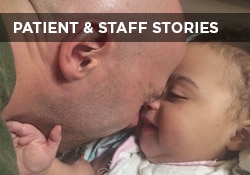This website uses cookies so that we can provide you with the best user experience possible. Cookie information is stored in your browser and performs functions such as recognising you when you return to our website and helping our team to understand which sections of the website you find most interesting and useful.

Susan E. Mazer, Ph.D. Blog
Thoughts and ideas on healthcare
Hi, and welcome to my blog! I'm Susan E. Mazer -- a knowledge expert and thought leader on how the environment of care impacts the patient experience. Topics I write about include safety, satisfaction, hospital noise, nursing, care at the bedside, and much more.
Patients, Privacy, and Hospital Noise
December 13, 2013
 I have been writing and speaking about hospital noise and patient privacy for more years than I care to remember and have come to the conclusion that no matter how we wrap it, hospital noise is an unruly child and patient privacy has been kidnapped by HIPAA. Further, the two seldom meet for coffee and do not like each other.
I have been writing and speaking about hospital noise and patient privacy for more years than I care to remember and have come to the conclusion that no matter how we wrap it, hospital noise is an unruly child and patient privacy has been kidnapped by HIPAA. Further, the two seldom meet for coffee and do not like each other.
Nonetheless, both patient privacy and hospital noise are born of the same gene pool: human activities, behaviors, wants and needs. And, they influence each other in ways neither wants to admit.
For example, the louder the background noise, the louder we talk, the greater the chance of being overheard. The quieter the environment, the more transparent the listening environment, the greater the chance of being overheard.
Research shows that it’s clear that most of us do not think about privacy until a situation comes up that violates our sovereignty of self or we meet someone we do not trust. And, noise — well, we habituate to it, tune it out, and only when necessary do we intervene to control it.
We have a love/hate relationship with sound; we are born into the world with everyone around us needing to hear us cry aloud. After that, crying turns on us and becomes our own worst reputation.
So, for our whole lives we “listen for sounds of life” and then pick and choose which sounds are good and which are bad.
In the hospital, however, policies and practices rarely put the two together. Speech privacy has finally been elevated to minimal standards of regulation for building materials.
Privacy already had doors and curtains. However, in Emergency Departments across the U.S., privacy breaches are occurring all the time.
Think about this: the safest communities are those in which people do not have to lock their doors.
The only reason we are now so phobic about patient privacy is that we are rightfully concerned that our medical records will be used against us and predatory employers and insurance companies will penalize us. It will take time for the Affordable Care Act to take hold for us to realize that this cannot happen.
In countries with universal healthcare, issues of privacy are about personal dignity. However, in the U.S., we have morphed privacy into financial security.
And, noise — all that annoys us — changes continuously. In fact, hearing an infant laugh is like music and hearing a drunk laugh is disgusting. So, minute by minute, we pick and choose.
In all fairness, the opposite of “noise” is not silence. What’s more, the opposite of being annoyed is not being annoyed — reducing distractions and sounds that frighten or agitate.
Reducing hospital noise does not mean full abandonment of all that makes a a patient comfortable. It does not mean solitude.
The late musician and composer, Vince Guaraldi (“Charlie Brown’s Christmas”), probably put it the best when he said, “When I walk into a room, I make a sound so that I won’t feel alone.”
What does that say about those of us in healthcare?










